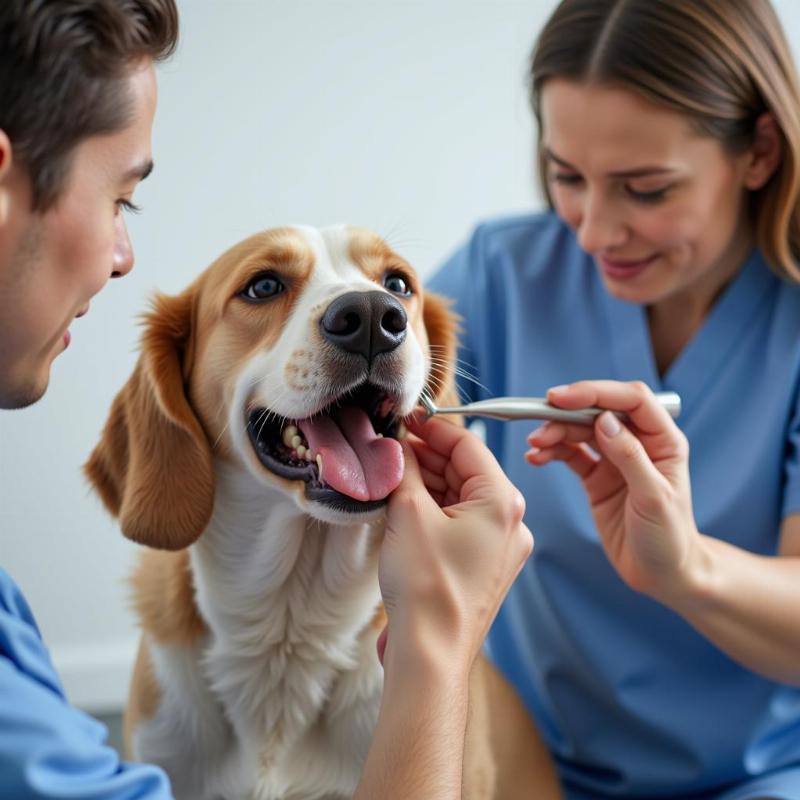If you’ve ever caught your furry friend gently gnawing on a blanket with their front teeth, you’re not alone. This common canine behavior, while often adorable, can leave owners puzzled. Why does my dog nibble blankets with his front teeth? Is it a sign of anxiety, boredom, or something else entirely? Understanding the reasons behind this behavior can help you better address your dog’s needs and ensure their well-being.
Teething Troubles and Comforting Chews
One of the most common reasons for blanket nibbling, especially in puppies, is teething. Just like human babies, puppies experience discomfort as their adult teeth emerge. The soft texture of a blanket can provide soothing relief to their sore gums. Similarly, adult dogs may nibble for comfort, especially if they’re feeling anxious or stressed. Blankets often carry familiar scents, providing a sense of security and comfort, much like a child’s cherished stuffed animal.
For teething puppies, offering safe and appropriate chew toys can help redirect their nibbling behavior. Look for toys specifically designed for teething, made from durable, non-toxic materials. Cooling chew toys can also provide extra relief for sore gums.
Boredom Busters and Mental Stimulation
Another common culprit behind blanket nibbling is boredom. Dogs are intelligent creatures who need mental and physical stimulation. A dog left alone for long periods with nothing to do might turn to blankets as a source of entertainment. This is especially true for breeds with high energy levels or strong chewing instincts.
To combat boredom, ensure your dog gets plenty of exercise and mental enrichment. Daily walks, playtime in the park, and interactive games can help keep them stimulated and engaged. Puzzle toys and treat-dispensing toys can also provide mental challenges and prevent boredom-induced nibbling.
Nutritional Needs and Underlying Medical Conditions
While less common, blanket nibbling could indicate underlying medical conditions or nutritional deficiencies. For example, pica, a condition that causes dogs to eat non-food items, can sometimes manifest as blanket nibbling. Similarly, certain nutritional deficiencies can lead to unusual cravings.
 Chó khám sức khỏe tại phòng khám thú y
Chó khám sức khỏe tại phòng khám thú y
If you suspect your dog’s blanket nibbling might be related to a medical condition, it’s crucial to consult with your veterinarian. They can perform a thorough examination and rule out any underlying health issues.
Conclusion: Addressing Your Dog’s Nibbling Needs
Understanding why your dog nibbles blankets is the first step towards addressing the behavior. Whether it’s teething, boredom, or something else, providing appropriate chew toys, mental stimulation, and regular veterinary checkups can help ensure your furry friend’s health and happiness. Remember, addressing the underlying cause, rather than just the symptom, is key to resolving this common canine quirk.
FAQ:
-
Is blanket nibbling always a problem? Not necessarily. Occasional nibbling, especially in puppies, is often normal. However, excessive or destructive nibbling should be addressed.
-
What kind of chew toys are best for teething puppies? Look for toys made from durable, non-toxic materials, such as rubber or nylon. Cooling chew toys can also provide extra relief for sore gums.
-
How can I tell if my dog’s nibbling is due to boredom? If your dog only nibbles when left alone for long periods or seems generally disinterested in their surroundings, boredom might be a factor.
-
When should I consult a veterinarian about blanket nibbling? If the nibbling is excessive, destructive, or accompanied by other unusual behaviors, it’s best to consult your vet.
-
Can anxiety cause blanket nibbling? Yes. Blankets can provide comfort and security, so anxious dogs might nibble on them for reassurance.
-
What are some signs of pica in dogs? Pica involves eating non-food items, such as rocks, dirt, or fabric. If you notice your dog ingesting these items, consult your vet immediately.
-
How can I make my dog’s environment more stimulating? Provide plenty of toys, regular exercise, and opportunities for social interaction. Puzzle toys and treat-dispensing toys can also provide mental enrichment.
Beautdogs.us is your premier source for comprehensive dog care information, breed expertise, and product recommendations. Whether you’re a new dog owner or a seasoned expert, Beautdogs.us provides reliable resources to help you navigate the exciting world of dog companionship. Contact us today for all your dog-related needs! Email: [email protected], Phone: +1 501-555-7529. Visit Beautdogs.us for more valuable insights and expert advice.